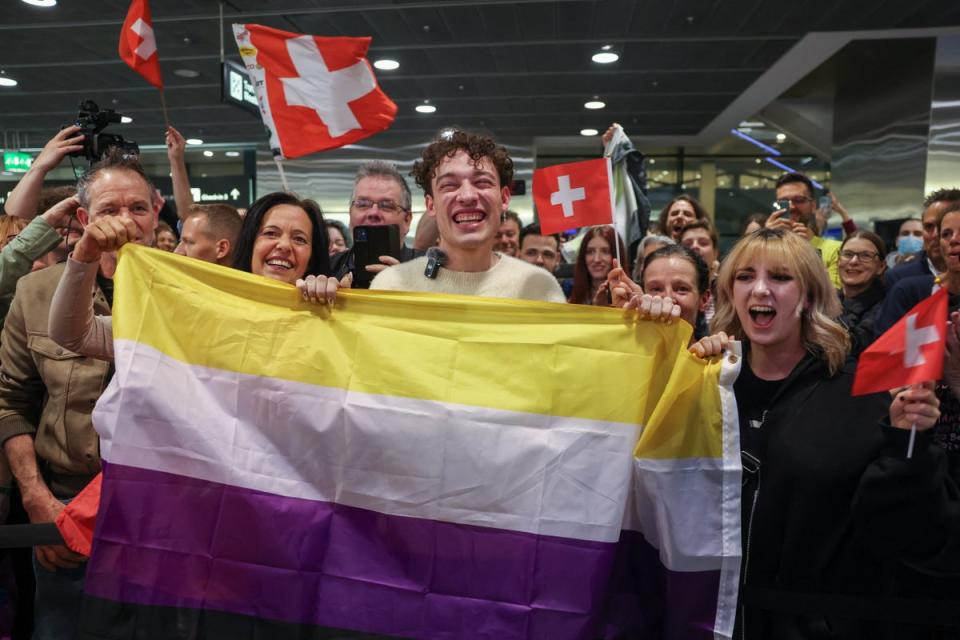Eurovision winner Nemo urges Switzerland to acknowledge third gender
Switzerland’s Nemo Mettler, the first non-binary person to win the Eurovision Song Contest, has called on their home country to recognise a third gender.
After triumphing with their song “The Code” at the competition’s final last Saturday (11 May), Nemo was outspoken about the ways in which the European Broadcasting Union (EBU) needs to “fix” problems within the competition.
The musician, 24, has now called for a change in their home country, asking that Swiss authorities allow non-binary designations on official documents.
“In Switzerland, there’s no entry for third gender. And I think that’s absolutely unacceptable,” Nemo told reporters after they were crowned winner, reports The Guardian. “We need to change that.”
Speaking to the publication, Nemo called on Beat Jans, Switzerland’s justice minister, in particular.
“We need to have the representation in our politics as well,” said Nemo, who said they had plans to meet with the minister to discuss the rights of non-binary people. “It’s really important that people feel seen.”
A spokesperson for Jans has confirmed that the pair were arranging a meeting.
The Swiss government has previously rejected calls to introduce a third gender option on its official documents, arguing that the binary model of gender continues to be “strongly anchored” in its society. Meanwhile, voices from the country’s Green Liberal party have backed Nemo’s recent calls asking the government to move away from its binary representations of gender.

Several countries include third gender classifications on official documents, including Australia, which allows people to opt between female, male, and indeterminate on passports, and Germany, which permits people to register as gender “diverse”. In the UK, non-binary genders are not legally recognised.
Nemo’s comments follow after this year’s contest was overshadowed by controversy over the EBU’s inclusion of Israel amid the country’s ongoing military campign in Gaza, which led to pro-Palestine demonstrations outside the arena in Malmö, Sweden. During the competition, boos were heard inside the auditorium as Israel’s entry Eden Golan took the stage.
Just hours before the final kicked off, Netherlands’ act Joost Klein was also disqualified from the competition following a backstage incident.
Nemo, who accidentally broke their trophy after being crowned winner, continued: “The trophy can be fixed – maybe Eurovision needs fixing a little bit too, every now and then.”

They also said their “whole experience was really intense, and not just pleasant all the way”, telling journalists: “There were a lot of things that didn’t seem like it was all about love and unity. And that made me really sad and at the same time... there was so much love here as well.”
Nemo called for “more compassion” and “empathy”, and said their win was dedicated to “people that are daring to be themselves and people that need to be heard and need to be understood”.
The winner also claimed to reporters that audience members were told they were not allowed to bring non-binary flags, a move that Nemo branded “unbelievable”.
“I had to smuggle my flag in because Eurovision said no, but I did it anyway, so I hope some people did that too,” they added. “But, I mean, come on, this is clearly a double standard.” The Independent has contacted the EBU for comment.
Switzerland won Eurovision with a whopping 591 points, closely followed by Croatia with 547 points.
Rounding out the top five were Ukraine (453 points), France (445 points) and Israel, who were awarded a full 12 points from the UK’s public vote and received 375 points overall.
The UK’s entry Olly Alexander finished in 18th place, out of 25, and received just 46 points for his song “Dizzy”, none of which came from the public TV vote.


